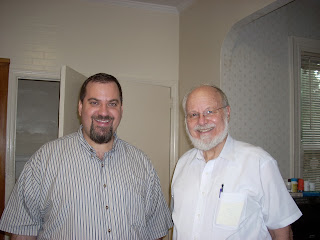Blast from the (recent) past - reinvigorating my idealism
About 5 years ago, when my wife & I were first considering moving away from the NYC area to some "out of town" location, I started & moderated a Yahoo Group list (remember those?) called “Moving On Out” to search for and encourage more LWMO communities in "out of town" areas. Specifically, I was looking for "open orthodox" type shuls, but in places way out of the usual cities they'd be found in. This was in the days of fresh excitement about Edah, YCT, etc.
The list ended up focusing on any shul of this type, irrespective of location, and had some lively discussions for about a year or so. After that, the blogosphere really came into its own and those Yahoo Groups saw much less traffic. The list still exists and is still officially active, but it gets a post only once every few weeks.
I just looked back through some of those old posts and there’s some good stuff.
What I wanted to post here today was what I wrote about what I considered the ideal shul. I still consider this to be the ideal place and re-reading it, I'm reinvigorated to find or found such a shul.
The list ended up focusing on any shul of this type, irrespective of location, and had some lively discussions for about a year or so. After that, the blogosphere really came into its own and those Yahoo Groups saw much less traffic. The list still exists and is still officially active, but it gets a post only once every few weeks.
I just looked back through some of those old posts and there’s some good stuff.
What I wanted to post here today was what I wrote about what I considered the ideal shul. I still consider this to be the ideal place and re-reading it, I'm reinvigorated to find or found such a shul.
Here’s what I said in July, 2004:
Are we here to promote a particular brand of Orthodoxy or simply to serve as a resource where one was needed? The members of this list probably self-define their religious affiliations across a relatively wide range. This is a natural result of the constituency this list is attempting to address. Were this a list about standard Orthodoxy, as defined by say, Young Israel, or the OU, there would naturally be much narrower definitions. The key thing about the sort of communities that we are trying to promote is their willingness to embrace diversity of opinions and ideas, albeit within a halachic structure. "Halachic" in itself is an amorphous term, defined in different ways by different people.
That said, I think that we can mostly agree that the sort of communities we wish to encourage fall in this general pattern:
A place that strives towards egalitarianism within the elasticity of traditional Halacha.
A place that is concerned with Tikkun Olam, with social justice, the environment, etc.
A place that encourages participation in the greater Jewish community, dialogue and friendship and a sense of community with Jews of whatever religious affiliation.
A deep commitment to Israel without marginalizing those who disagree politically with the future direction the State of Israel may take, whether in the realm of security or socially. People may disagree with one another respectfully and have debate these issues based on merits, rather than with insults ("Anti Israel, Self- hating Jew" and the like.)
A lay led congregation. This is not to negate the role of a Rabbi, but to encourage as well the participation of individuals in running the shul or minyan. Most traditional congregations, of whatever stream, have a "top-down" style where congregants defer to the Rabbi and board in most ways. One common factor in the energy and vitality in most of the new minyanim and chaburot around the country has been the enthusiastic involvement of individual members that really foster a sense of community.
An intellectual center where classes and group discussion are encouraged. Being intellectually inquisitive about one’s Yahadut is what leads to greater involvement, not just waiting for the rav to give his latest drasha. Within that intellectual realm, there should be an openness to ideas from all sectors. It should be the kind of place where no question is looked at as being sacrilegious. The answers may fall within a certain context, but rarely, if ever, should a question be off limits. An intellectualism that acknowledges that outside of classical Judaism there can be valuable scholarship that can make our understanding of our Judaism ever richer.
And finally, a place where people come to truly daven. Where tefilla is not just a ritual obligation to get through. Something that has been noted in many of these new minyanim is the lack of noisy chatter that pervades so many Orthodox congregations. This is because everyone really wants to be there and really cares about the Tefilla. If the davening is beautiful, more people will participate and sing, which will cause it to grow even more beautiful.

Comments
Post a Comment